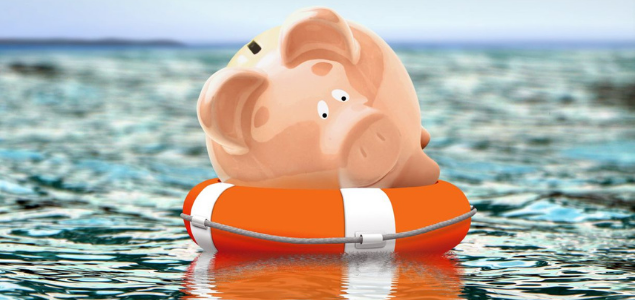.png?width=750&height=145&name=Untitled%20design%20(13).png)

What is an emergency fund?
An emergency fund is an account with money set aside to cover large, unexpected expenses, such as:
- Unforeseen medical expenses,
- Big ticket home repairs,
- Unexpected car trouble,
- Unemployment, or
- Any other surprise expenses.
Why do I need an emergency fund?
Emergency funds create a financial buffer that can keep you on track in a time of need without having to rely on credit cards or high-interest loans. It can be especially important to have an emergency fund if you have a lot of debt, because it can help you avoid borrowing more - a sure way to spiral out of control.
How much should I save?
The optimal rule of thumb is at least three months and up to a half a year of expenses.The right amount for you depends on your financial circumstances. If you lose your job, for instance, you could use the money to pay for necessities while you find a new one. If you are just scraping by, the larger your emergency fund, the better you will sleep at night knowing that you have a safety net, should the worst case scenario play out.
Where do I put my emergency fund?
A savings account with easy access. Because an emergency can strike at any time, having quick access is crucial. But the account should be separate from a bank account you use daily, so you’re not tempted to dip into your reserves. The money should never be placed in an account that could lose value - like a stock fund. The emergency fund must be safe, secure, liquid and separate from your operating account.
How do I build an emergency fund?
- Set a monthly savings goal. This will get you into the habit of saving regularly and will make the task less daunting. One way to do this is by automatically transferring funds to your savings account each time you get paid.
- Keep the change. When you get $1 and $5 bills after breaking a $20, drop some in a jar at home. When the jar fills up, move it into your savings account. If you don’t carry cash, you could try a mobile savings app that makes automatic transfers, with rules that are based on the transactions you make.
- Move money into your savings account automatically. If your employer offers direct deposit, there’s a good chance they can help you break up your paycheck into multiple checking and savings accounts so that your monthly savings goal is taken care of without ever going to your checking account.
- Save your tax refund. You get a shot at this once a year at tax time — and only if you expect a refund. Saving it can be an easy way to boost your emergency fund. When you file your taxes, consider having your refund deposited directly into your emergency account. Strategically, you can adjust your W-4 tax form so that you have less money withheld. Then direct the extra cash into your emergency fund.
When saving, draw a line between emergencies and everything else.
In fact, once you’ve hit a reasonable threshold of emergency savings, it’s a good idea to begin another savings account for irregular but inevitable items such as car maintenance, vacations and clothing. If you need help staying organized, many banks allow customers to create and label sub-accounts for different financial goals.
Everyone needs to save for the unexpected. Having something in reserve can mean the difference between weathering a short-term financial storm or going deep into debt. The main takeaway is to start - and there is no better time than right now.
Not NCUA Insured • No Credit Union Guarantee • May Lose Value • Not a Credit Union Deposit